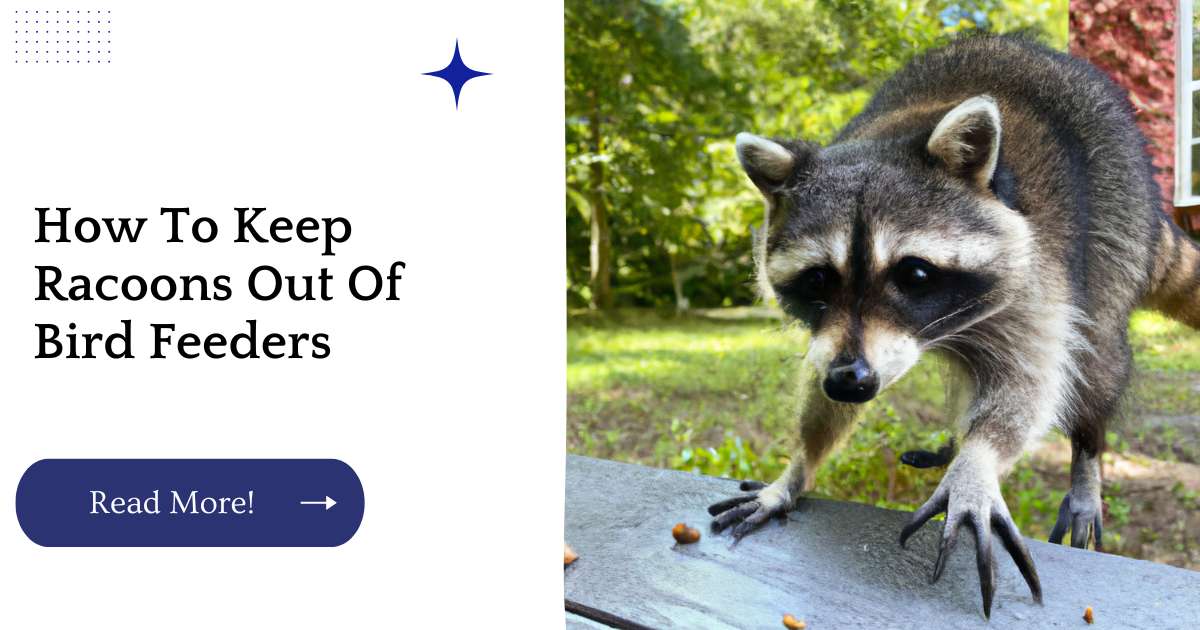Raccoons are a nuisance and can be dangerous. They often try to get into bird feeders, which is bad for the birds in your yard, especially when they’re trying to feed their babies.
| Key Takeaways |
|---|
| Raccoons are skilled climbers and can easily access bird feeders if not properly secured. |
| Adding a baffle or cage to bird feeders can prevent raccoons from accessing them. |
| Natural repellents, such as citrus or spicy peppers, can be effective at deterring raccoons. |
| Hanging bird feeders higher may not always deter raccoons, as they are skilled at climbing trees and poles. |
| Using a combination of deterrence methods can be the most effective way to keep raccoons away from bird feeders. |
So how do you keep raccoons out of your bird feeder?
Capsaicin
Capsaicin is the active ingredient in hot peppers. It’s what gives chili peppers their spiciness, and it’s also a natural repellent for raccoons.
If you have something that smells like a hot pepper, chances are a raccoon will stay away from it. You can purchase capsaicin at any pet store and apply it to your bird feeder to keep raccoons from getting near it.
Catching a raccoon can be easy, but it’s important to know the proper methods. Check out our guide on how to catch raccoons for tips on how to safely and effectively remove raccoons from your property.
Hot Pepper Flakes
Hot pepper flakes are great for deterring raccoons. The capsaicin in hot peppers is a natural irritant that can cause a raccoon to avoid an area if he or she comes into contact with it.
It’s also possible that adding hot pepper flakes to your bird feeder pole will make it uncomfortable for the raccoon to climb, as the capsaicin causes irritation when rubbed against bare skin.
Hot Pepper Flakes
You can find hot pepper flakes at most grocery stores and big box retailers, but if you don’t want to buy them online, consider making your own! You’ll need:
- 2 lbs of red jalapeno peppers (about 12)
- 1 tablespoon olive oil
- 1 gallon ziplock bag
Cayenne Pepper
You can also try placing cayenne pepper near your bird feeders. This is a natural deterrent for raccoons, but it’s important to make sure that you’re using the correct type of cayenne pepper.
Cayenne peppers are generally sold in three different forms: flakes, powders and liquids. If you have a choice between these and are trying to decide which one would work best for keeping raccoons away from your bird feeder, then we’d recommend going with flakes or powders over liquids because they tend to be more effective at keeping raccoons out of your yard.
If you do decide on using cayenne pepper as a deterrent against raccoons, then make sure that you’re applying it correctly so that it works properly.
You should sprinkle it around your yard in wide swaths so that there is no chance that any part of the ground will be missed by any passing animals such as squirrels or rodents who could potentially get into an area where there isn’t anything stopping them from reaching the feeder itself (such as some sort of barrier between where they normally live/eat outside at night).
Keeping raccoons away from your property can seem like a challenge, but there are simple steps you can take. Our guide on how to keep raccoons away is filled with helpful tips to keep your property raccoon-free
Citrus Oil or Vinegar
Citrus oil or vinegar can be used to keep raccoons away from your bird feeder. To use this method, spray the citrus oil or vinegar directly onto the bird feeder and watch it deter the raccoons from getting close.
You can also spray the citrus oil or vinegar on their food source if you want to make sure that they don’t come back for a while!
Ammonia
Ammonia is a natural deterrent for raccoons. They don’t like the smell of it and will not stay around if ammonia is present in any way.
If you have an open-top bird feeder, you can use the ammonia to your advantage by simply pouring some into a bowl and using that as your new food dish.
If you have a hanging bird feeder, there are still ways to incorporate ammonia into your plan of attack against raccoons.
Pouring some under the base of the feeder will cause it to drip down onto the ground below where raccoons are less likely to visit as they do not enjoy being near urine or feces (which is what ammonia smells like).
One important thing to note before using this method is that once you’ve used up all of your supply of ammonia, make sure it’s disposed of properly!
Ammonia should not be poured down drains or sewers because it can create dangerous situations when interacting with other chemicals being used by cities/towns/etc., so make sure you clean up after yourself!
Having a raccoon in your attic can cause damage to your home and be a health hazard. Our guide on how to get rid of raccoons in the attic explains the necessary steps to safely remove raccoons from your home
Hair from Pets
The hair from your pet will work just as well as a raccoon’s own gray pelt. The difference between the two is that raccoon hair is longer and coarser, but it still works to keep these pests away. If you have a dog or cat, consider saving their fur for this purpose.
Just make sure that if you have more than one furry creature in your household (like a dog and cat), you don’t use their fur from both at once!
You can place the hair around the bird feeder itself or on nearby surfaces where it might be easy for them to reach up through the bars of your cage cage bird feeder cage bird feeders to get into your food supply.
You’ll have to experiment with different placement options so that you find out which ones work best for keeping those pesky critters out of trouble!
Electric Scarers
An electric scarer is an easy way to keep raccoons out of your bird feeder. This device creates a loud noise that scares the pest away and keeps it from returning.
To use an electric scarer, place it in or near your bird feeder so that it’s pointed in the direction of where you normally see raccoons approaching.
The sound will deter them from coming back around. For example, if you see raccoons jumping over the fence and heading toward the tree with your feeder on top, place the electric scarer near this area so that it faces outward toward whatever direction they came from (such as toward their home).
Most models are quite affordable: just $20 – $30 at most retailers online (including Amazon). They can also be used inside or outside since they’re weatherproofed against rain and snow!
If you have several different types of feeders on one tree branch (like blue jays as well) then buy multiple units so each type of animal gets its own warning signal; otherwise only one unit will be needed per species since all birds have similar hearing abilities anyway.”
Raccoons can be attracted to trash cans, creating a mess and potentially spreading disease. Check out our guide on keeping raccoons out of trash for helpful tips on how to secure your garbage and prevent raccoons from accessing it.
Get A Guard Dog
A guard dog is your best bet for keeping raccoons away from your bird feeders, but it’s not a foolproof solution.
The most important thing to remember when using a guard dog is that you need one that’s been trained well enough to be able to keep a raccoon out of the yard.
If your guard dog isn’t capable of preventing an invasion, then he might actually be more harmful than helpful.
Guard dogs should also be friendly enough for children and other pets (and people) in the home to interact with him safely; if he barks too much or becomes aggressive toward family members or guests, that won’t go over well either!
Guard Dog Recommendation
| Guard Dog Breed | Characteristics |
|---|---|
| Akita | Guarding instincts, loyal, protective |
| Doberman Pinscher | Intelligent, alert, natural protectors |
| German Shepherd | Confident, courageous, protective |
| Rottweiler | Powerful, territorial, brave |
Finally, make sure you choose a breed small enough not only to fit through small spaces like those used by squirrels and other rodents but also big enough to intimidate larger animals such as cats-or even people!
Raccoons can wreak havoc on gardens, damaging crops and causing chaos. Our guide on how to keep raccoons out of the garden explores various methods to deter raccoons from the garden, from physical barriers to natural repellents
Conclusion
You should now be able to keep raccoons out of your bird feeders. Give these methods a try and see which one works best for you!
Further Reading
Raccoons and Bird Feeders – This article from The Humane Society gives an overview of raccoons and bird feeders, as well as tips on how to deter raccoons from causing damage.
How to Keep Raccoons Off Bird Feeders – Bird Watching HQ provides helpful tips and techniques for keeping raccoons away from bird feeders.
Deterring Raccoons from Your Bird Feeders – This article from Perky-Pet offers detailed instructions and products for keeping raccoons away from bird feeders.
FAQs
Can raccoons climb bird feeders?
Yes, raccoons have sharp claws and are able to climb up bird feeders in order to access the food that’s inside.
Will hanging bird feeders higher prevent raccoons from accessing them?
Not necessarily, as raccoons are skilled at climbing trees and poles. It’s important to use additional methods of deterrence, such as baffles or metal cages.
Are there specific types of bird feeders that are less attractive to raccoons?
Yes, hanging feeders that are not accessible from nearby trees or structures can be more difficult for raccoons to access. Tube feeders can also be effective because raccoons cannot reach inside the narrow tube.
Are natural repellents effective at deterring raccoons from bird feeders?
Some natural repellents, such as citrus scents or spicy peppers, can be effective at deterring raccoons from bird feeders. However, it’s important to apply these repellents regularly and be cautious when using them around other animals.
How do I know if a baffle will fit my bird feeder?
Before purchasing a baffle, it’s important to measure the diameter of your bird feeder pole or hanging apparatus in order to ensure a proper fit.

Hello! I’m Hellen James, and I write about how to keep pests from invading your home. For the last 10 years, I’ve been working in pest control and am excited to share my expertise with you!


